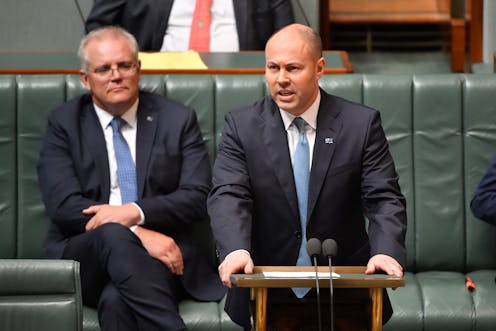This budget will only work if business and consumers play ball
- Written by Michelle Grattan, Professorial Fellow, University of Canberra

This is an extraordinary giveaway budget, driven by desperate circumstances that would have been inconceivable less than a year ago.
The debt and deficit numbers are predictably eye-watering - but the gamble is whether they are big enough.
The Morrison government is pleading.
In particular, it is begging business to chance its hand and invest, so that activity and jobs can be restored ASAP.
Read more: Budget 2020: Frydenberg tells Australians, ‘we have your back’
The incentives being handed to business are enormous. But it all comes down to that elusive necessity – confidence. It’s the old question about horses and whether they will drink when the water is shoved into the trough before them.
Equally, the government is also appealing to individuals to spend, and then spend some more.
There will be argument about whether it is making this pitch in the most effective way – the accelerated tax cuts have their critics.
They’ll certainly give many people more ready cash over coming months. The unknown is whether in these uncertain times the purse strings will be loosened.
The modest cash payments for pensioners – two lots of $250 – are also directed to boosting consumption. The first payment is December, nicely timed for some (modest) Christmas presents, to help the retail sector just when it needs assistance.
Read more: Budget 2020 at a glance: the cuts, the spends, and that big deficit in 7 charts
In its subsidy for businesses to hire younger unemployed people the government is acknowledging the recession will particularly hurt this generation.
It is imperative to get as many as possible of those thrown out of work back into the labour force as fast as possible.
The motive is sound, but how effective the program will be is another matter. Much will depend on whether employers feel confident enough to take on staff.
These younger people have to hope the employers respond, because the Coronavirus supplement that has enhanced JobSeeker is being wound back, and is due to end, while how much the basic JobSeeker payment will eventually be set at is a decision yet to be made.
The budget also notes women have been hard hit by the pandemic, and it includes a “women’s economic security statement”. But its $240 million in measures seems, to put it mildly, modest when compared to other initiatives.
Among the unusual features of this unique budget is the relative absence of cuts. The government has been finding ways to get money out the door, not reining in expenditures.
Read more: Budget 2020: promising tax breaks, but relying on hope
Frydenberg reprised the messages we’ve been hearing in past months from the government, which has prepared the ground for this tsunami of debt and deficits.
The debt would be a heavy burden, but it was a necessary one to “deal with the greatest challenge of our time”.
Some Liberals might have residual nightmares about debt but it is generally accepted by economists that it is totally manageable, and not even exceptional on international comparisons even if a shock in the Australian context.
Frydenberg repeated that the government’s initial measures to cushion the economic fallout of the pandemic had been “temporary, targeted, and proportionate”.
But the economic support cannot be temporary and this budget represents the next phase of it.
Read more: The budget's tax cuts have their critics, but this year they make fiscal sense
JobKeeper will be wound back, despite many experts believing it should extend much longer than its planned life, but other mechanisms have to be deployed to support the economy.
The budget is attempting to make a successful transition from the direct support represented by JobKeeper to indirect support through the use of tax breaks to encourage business investment.
At some stage, the transition has to be made. That’s recognised by both sides of politics. The debate is around the timing and the mechanism for making it.
While assuring us the government has our backs, Frydenberg had a double message for Australians in his budget speech. “The road to recovery will be hard,” he said. “But there is hope.”
Among the hopeful assumptions in the budget is that “a population-wide COVID-19 vaccination program will be fully in place by late 2021”.
That’s perhaps the biggest call of all.
Read more: The budget assumes a COVID-19 vaccine becomes available next year. Is this feasible?
Authors: Michelle Grattan, Professorial Fellow, University of Canberra
Read more https://theconversation.com/this-budget-will-only-work-if-business-and-consumers-play-ball-147013




